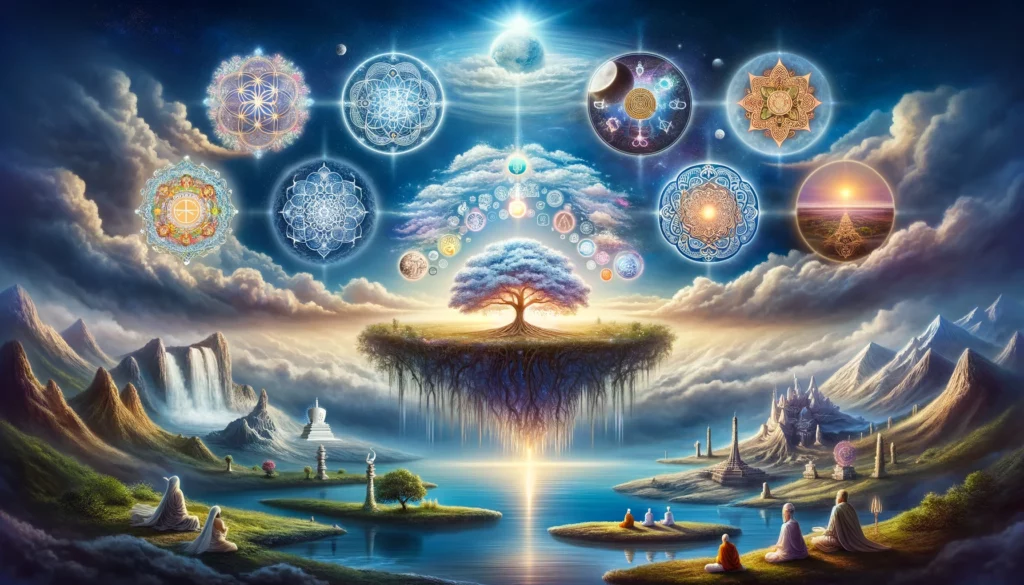
The universality of the concept of transcendence, a common thread that runs through the diversity of religious traditions, is a testament to our shared human experience. It is a recognition of a vaster reality beyond the physical world we perceive, often described as transcendent, infinite, and beyond human comprehension. This vaster reality is the source of all existence, the ground of being, from which all things manifest. The belief in this transcendent reality reflects a yearning that is not unique to any one faith, but a shared human desire to escape the limitations of the physical world, to experience a deeper connection to the divine, and to attain a state of lasting peace and fulfillment.
Understanding The Essence Of Transcendent Reality
The concept of transcendence, however, manifests across different religions in various forms. In Hinduism, the ultimate goal is to achieve moksha, or liberation from the cycle of birth and death, and merge with the supreme consciousness, Brahman. In Buddhism, the path to enlightenment involves a transcendent reality that crosses an illusion of the self and attaining nirvana, a complete liberation from suffering.
In the Abrahamic faiths of the West, the ground of being is God or Allah. In Judaism, despite transcendence, God establishes a covenant relationship with the Jewish people, revealing himself through prophets and laws. Christians believe in the Trinity: God exists as three persons (Father, Son, Holy Spirit) in one being. While the Son, Jesus Christ, takes on human form and interacts with the world, the Father remains transcendent. In Islam, the belief in Allah as the transcendent, all-knowing, and all-powerful being underscored the faith. The ultimate reality is represented by the afterlife, where believers hope to attain paradise through righteous living and faith.
In Taoism, it is the Tao. Ancient philosophers like Plato and modern philosophers like Immanuel Kant believed in a transcendent realm of ideas. Nirvana in Buddhism and Moksha in Hinduism are transcendent states that exist entirely outside space and time.
As we explore the depths of our consciousness and the mysteries of the universe, we begin to glimpse the vastness beyond. And as we open ourselves to the vaster reality, we open ourselves to a life of greater meaning, purpose, and joy.
The diversity of practices employed to achieve transcendence across religions is a testament to the richness and variety of human spiritual expression. Meditation, prayer, rituals, fasting, and acts of devotion are common practices aimed at quieting the mind, purifying the heart, and connecting with the divine. In some traditions, psychedelic substances or ecstatic experiences are used to induce altered states of consciousness that facilitate transcendence. This diversity of approaches invites us to explore and appreciate the different paths to transcendence, broadening our understanding and respect for the various religious traditions.
In a world that often prioritizes material pursuits and immediate gratification, the pursuit of transcendence serves as a powerful counterbalance. It reminds us of the deeper dimensions of human existence, offering a profound and lasting source of fulfillment. By recognizing the commonality of this quest across different religions, we can gain a greater appreciation for the diversity of human spiritual expression and find inspiration in the shared aspiration to transcend the limitations of ordinary reality. This understanding can inspire us to seek deeper meaning in our lives, beyond the transient and superficial, and to connect with something greater than ourselves.
Quotes On Spiritual Transcendence From Sacred Texts
Christianity
“My kingdom is not of this world.”
– John 18:36
“Life is this simple: we are living in a world that is absolutely transparent and the divine is shining through it all the time. This is not just a nice story or a fable, it is true.”
–Thomas Merton, Christian monk
Buddhism
“Nirvana is not a place to be reached, it is a state of mind to be realized.”
–Buddha
Sikhism
“He Himself is the Creator, the Cause of causes; understanding His Command, we become free of desires.”
–Guru Granth Sahib
Judaism
“Every entity regards itself as exalted over another entity. Darkness regards itself as exalted over the deep, because it is above it. Air, as exalted over water, because it is above it. Fire, as exalted over air, because it is above it. The heavens, as exalted over fire, because they are above it. But the Holy One, blessed be He, is truly exalted over them all.”
—Sefer Ha-Aggadah, collection of Jewish writings
Taoism
“Imagine a nebulous thing
Here before Heaven and Earth
Subtle and elusive
Dwelling apart and unconstrained
It could be the mother of us all
Not knowing its name
I call it the Tao.”
— Tao Te Ching, Taoist text
Hinduism
“This multitude of beings is created and destroyed again and again in the succeeding days and nights of Brahma. But beyond this formless state there is another, unmanifested reality, which is eternal and is not dissolved when the cosmos is destroyed.”
—The Bhagavad Gita, Hindu text
Islam
“To Allah belongs the unseen of the heavens and the earth.”
–Qur’an 11:123“And We have not created the heavens and the earth and that between them in play. We have not created them except in truth, but most of them do not know.”
–Quran (44:38-39)
Related reads
False Narratives | Charioteer | Sacred Words | Religious Wear | Cosmic Tree | Beyond Happiness | Tree Of Life | Sacred Music | Fire As A Symbol | Allegory Of The Cave | The Great Flood | Creation Story
For more reflections on personal growth, wisdom and happiness, browse through our website.


